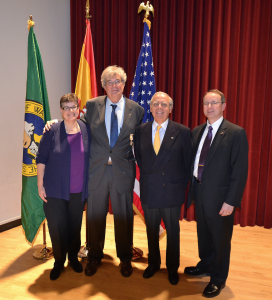ALBA’s Tony Geist Awarded Knighthood

From left, UW President Ana Mari Cauce; Geist; Luis Fernando Esteban, Spain’s honorary consul in Washington state; and UW Dean of Arts & Sciences Robert Stacey. Photo by Angel Arbeteta.
Our colleague Tony Geist—the longest serving ALBA Board member, professor of Spanish at the University of Washington, author and translator—has been awarded one of Spain’s highest civil honors, membership into the Order of Isabella the Catholic with the first-class title of Caballeros de la Gran Cruz de Oficial, or Knights of the Officer’s Cross. The honor is conferred on those who have given exceptional service to the benefit of Spain.
In a ceremony in Seattle on April 15, the award was bestowed on Geist by Spain’s Honorary Consul, Luis Fernando Esteban, and featured a concert by Grammy Award-winning pianist Chano Dominguez. Geist said his “enduring love affair” with Spain began with his first visit there as a junior from the University of California, Santa Barbara. Since then, he has devoted his professional life to studying and teaching the language, literature, history and culture of Spain. “The award recognizes the richness and beauty of Spanish literature and culture and its importance in the United States,” Geist said. “I am honored to have contributed to its presence in this country and on the UW campus.”
Tony Geist has published a dozen books, including La poética de la Generación del 27 y las Revistas Literarias (1980), Cartografía Poética (2004) and El Canon Abierto (2015), as well as roughly 100 articles. He was also curator and author of ALBA’s 2002 traveling exhibition and book, They Still Draw Pictures: Children’s Drawings from the Spanish Civil War to Kosovo, and a 2001 photo essay and 2006 documentary about the Abraham Lincoln Brigade. His documentary film, Souls without Borders (2006) included interviews with many veterans of the Lincoln Brigade. He was also instrumental in creating the first public monument to the Lincoln Brigade in this country in 1998.
This article is an abridgement of Peter Kelley’s piece in UW Today.












